Energy Efficiency
How Heat Pump Efficiency Diminishes Environmental Damage

We’ve all felt the impact of rising energy costs and the urgent need to protect our environment. That’s why it’s crucial to explore innovative solutions like heat pump technology. By maximizing efficiency, we can significantly reduce environmental damage caused by traditional heating and cooling systems.
Imagine a world where we can stay comfortable while minimizing our carbon footprint. In this article, we will delve into the fascinating realm of heat pump efficiency and its potential to create a sustainable future for us all.
Key Takeaways
- Heat pump technology significantly reduces environmental damage caused by traditional heating and cooling systems.
- Maximizing heat pump efficiency leads to significant energy savings and lower operating costs over time.
- Heat pumps produce fewer carbon emissions compared to traditional systems.
- Integrating renewable energy sources like solar panels with heat pumps reduces reliance on fossil fuels and decreases greenhouse gas emissions.
Understanding the Environmental Impact of Energy Use
We need to understand the environmental impact of our energy use in order to make informed decisions about reducing our carbon footprint.
Energy conservation is crucial in mitigating the negative effects of our energy consumption. By conserving energy, we can decrease our reliance on non-renewable resources, such as fossil fuels, and instead promote the use of renewable resources like solar and wind power.
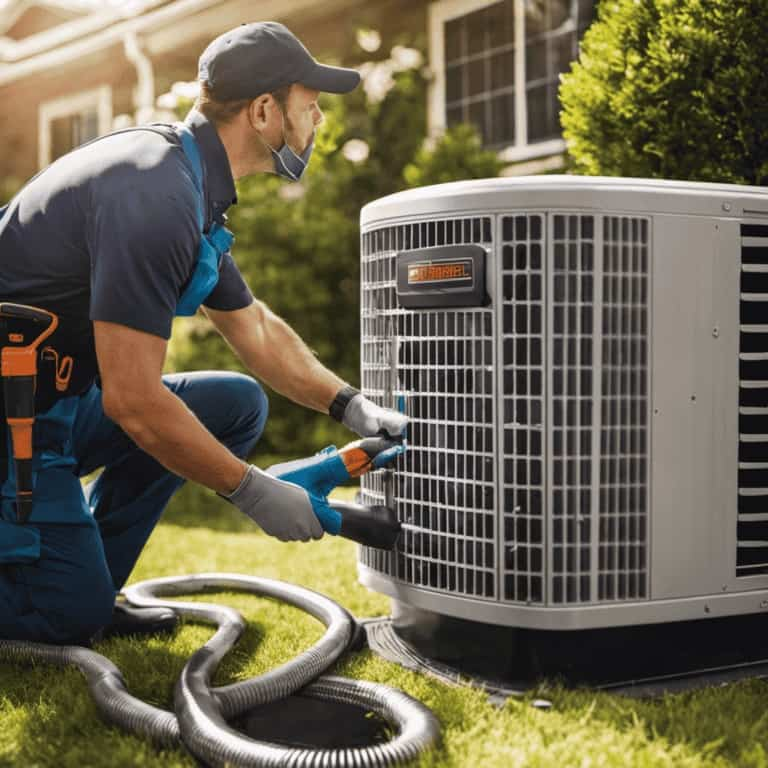
Understanding the environmental impact also involves recognizing the consequences of our actions, such as greenhouse gas emissions and air pollution. By comprehending these impacts, we can actively work towards minimizing our energy consumption and transitioning to cleaner, greener alternatives.
This understanding will form the foundation for exploring the benefits of heat pump efficiency, which offers a promising solution to reducing environmental damage caused by traditional heating and cooling methods.
Exploring the Benefits of Heat Pump Efficiency
Maximizing heat pump efficiency can lead to significant energy savings and reduced environmental impact. By improving energy consumption and reducing carbon emissions, heat pump efficiency offers numerous benefits for both individuals and the planet. Let’s delve into the advantages of heat pump efficiency in more detail:
| Benefits of Heat Pump Efficiency | ||
|---|---|---|
| 1. Energy Savings | 2. Lower Operating Costs | 3. Reduced Carbon Footprint |
| Heat pumps with high efficiency ratings consume less energy, resulting in lower utility bills. | Improved efficiency means less energy is required to operate the heat pump, leading to cost savings over time. | Heat pumps produce fewer carbon emissions compared to traditional heating and cooling systems, helping to mitigate climate change. |
Factors Influencing Heat Pump Energy Efficiency
To achieve optimal heat pump energy efficiency, it’s important to consider various factors. These factors can significantly impact the performance of the heat pump and its ability to operate efficiently. Here are four key factors that influence heat pump energy efficiency:

-
Proper sizing: Ensuring that the heat pump is correctly sized for the space it’s intended to heat or cool is crucial. An undersized or oversized heat pump won’t operate efficiently and may result in higher energy consumption.
-
Insulation: The insulation of the building plays a vital role in heat pump efficiency. Well-insulated spaces retain heat better, reducing the workload on the heat pump and improving its energy efficiency.
-
Climate conditions: The climate in which the heat pump operates can greatly affect its performance. Extreme temperatures, such as very cold winters or hot summers, can decrease the efficiency of the heat pump.
-
Regular maintenance: Regular maintenance is essential to ensure the heat pump operates at its optimal efficiency. Regular cleaning, filter replacement, and inspection of components can help identify and address any issues that may impact its performance.
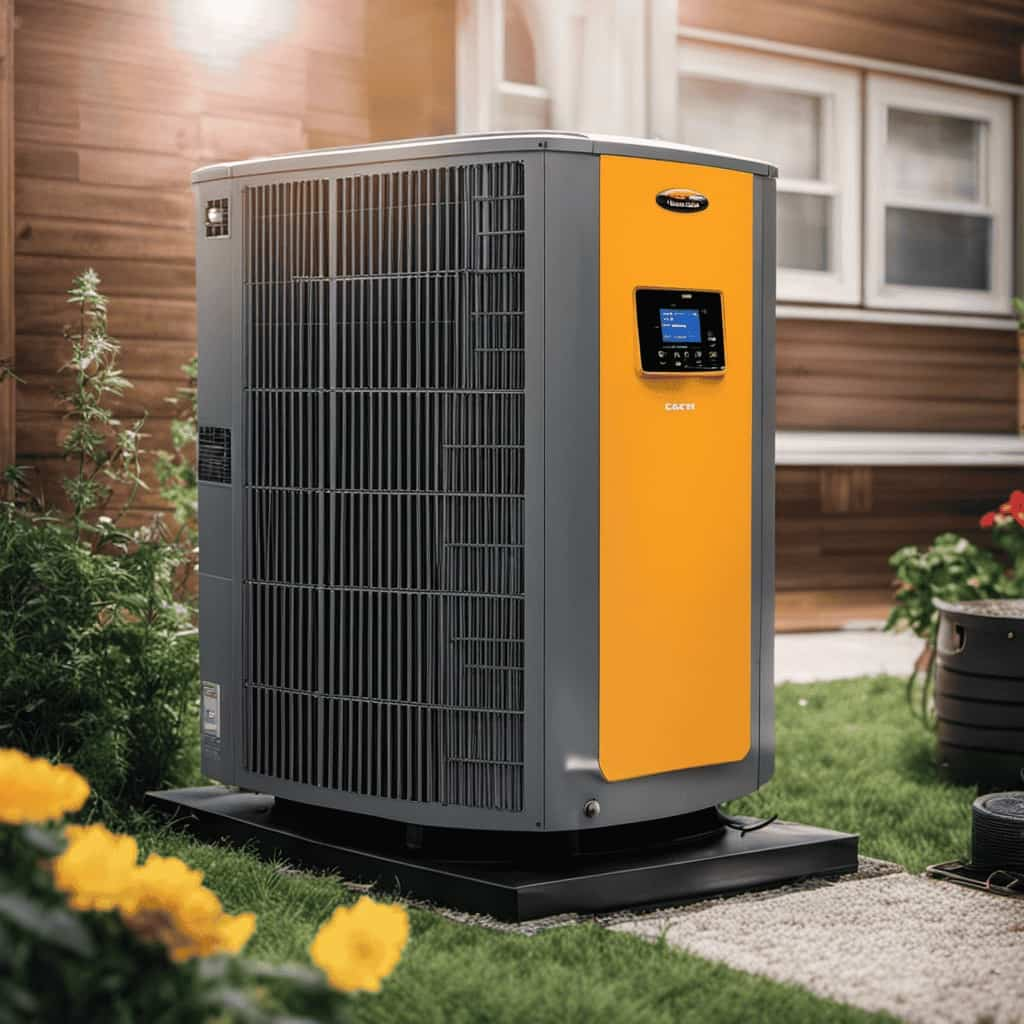
Ways to Maximize Heat Pump Efficiency for Environmental Benefits
Our goal is to find effective ways to maximize heat pump efficiency for the benefit of the environment. Heat pump maintenance plays a crucial role in ensuring optimal performance and energy savings. Regular maintenance, such as cleaning filters and coils, checking refrigerant levels, and inspecting electrical connections, can prevent system inefficiencies and reduce energy consumption. Another way to boost heat pump efficiency is through the integration of renewable energy sources. By combining heat pumps with solar panels or wind turbines, we can harness clean, renewable energy to power the heat pump system. This not only reduces reliance on fossil fuels but also minimizes greenhouse gas emissions. To emphasize the importance of heat pump maintenance and renewable energy integration, let’s take a look at the table below:
| Ways to Maximize Heat Pump Efficiency | Environmental Benefits |
|---|---|
| Regular maintenance | Energy savings |
| Integration of renewable energy sources | Reduced reliance on fossil fuels |
| Decreased greenhouse gas emissions |
The Future of Heat Pump Technology and Environmental Sustainability
As we look ahead, advancements in heat pump technology and the integration of sustainable practices will continue to contribute to environmental sustainability.
The future developments in heat pump technology hold great promise in further reducing the environmental impact of heating and cooling systems. Here are four ways in which heat pump technology is expected to evolve in the coming years:
-
Enhanced Efficiency: Future heat pumps will be designed to operate with even higher efficiency, maximizing their energy-saving potential and minimizing greenhouse gas emissions.
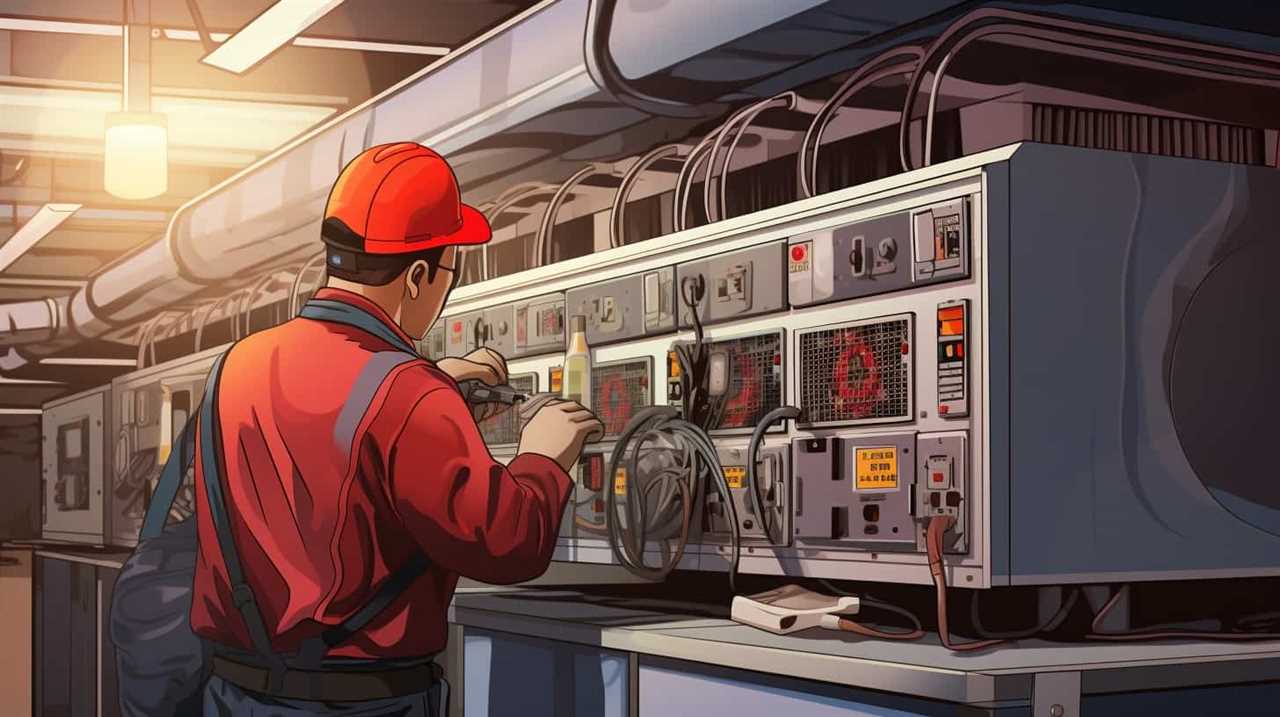
-
Integration with Renewable Energy Sources: Heat pumps will increasingly be integrated with renewable energy sources such as solar and wind power, further reducing reliance on fossil fuels and promoting the use of clean, sustainable energy.
-
Smart and Connected Systems: Advancements in technology will enable heat pumps to be connected to smart home systems, allowing for optimized energy management and increased efficiency.
-
Lifecycle Assessment: Future developments will focus on conducting comprehensive lifecycle assessments of heat pump systems, considering the environmental impact from production to disposal, and identifying areas for further improvement.
Frequently Asked Questions
Are Heat Pumps Better for the Environment Than Traditional Heating and Cooling Systems?
Yes, heat pumps are better for the environment than traditional heating and cooling systems. They consume less energy and have higher efficiency compared to traditional HVAC systems, reducing environmental damage.

What Are the Potential Drawbacks or Limitations of Using Heat Pumps for Environmental Benefits?
Drawbacks and limitations of heat pumps include initial installation cost, dependence on electricity, and potential inefficiencies in extreme temperatures. However, with technological advancements, these limitations can be minimized, making heat pumps a viable option for reducing environmental damage.
How Does the Location or Climate Affect the Efficiency and Environmental Impact of Heat Pumps?
Location and climate greatly influence heat pump efficiency. Insulation plays a crucial role in minimizing energy loss. By optimizing these factors, we can enhance performance, reduce environmental impact, and create a more sustainable future.
Are There Any Government Incentives or Programs Available to Promote the Use of Heat Pumps for Environmental Reasons?
There are government incentives for heat pumps that promote their use for environmental reasons. These incentives aim to reduce carbon emissions and encourage the adoption of energy-efficient heating and cooling systems.
Can Heat Pumps Be Used in Conjunction With Renewable Energy Sources to Further Reduce Environmental Impact?
Yes, heat pumps can be used in conjunction with renewable energy sources to further reduce environmental impact. By integrating renewable energy and utilizing energy efficient heating, we can greatly decrease our carbon footprint.
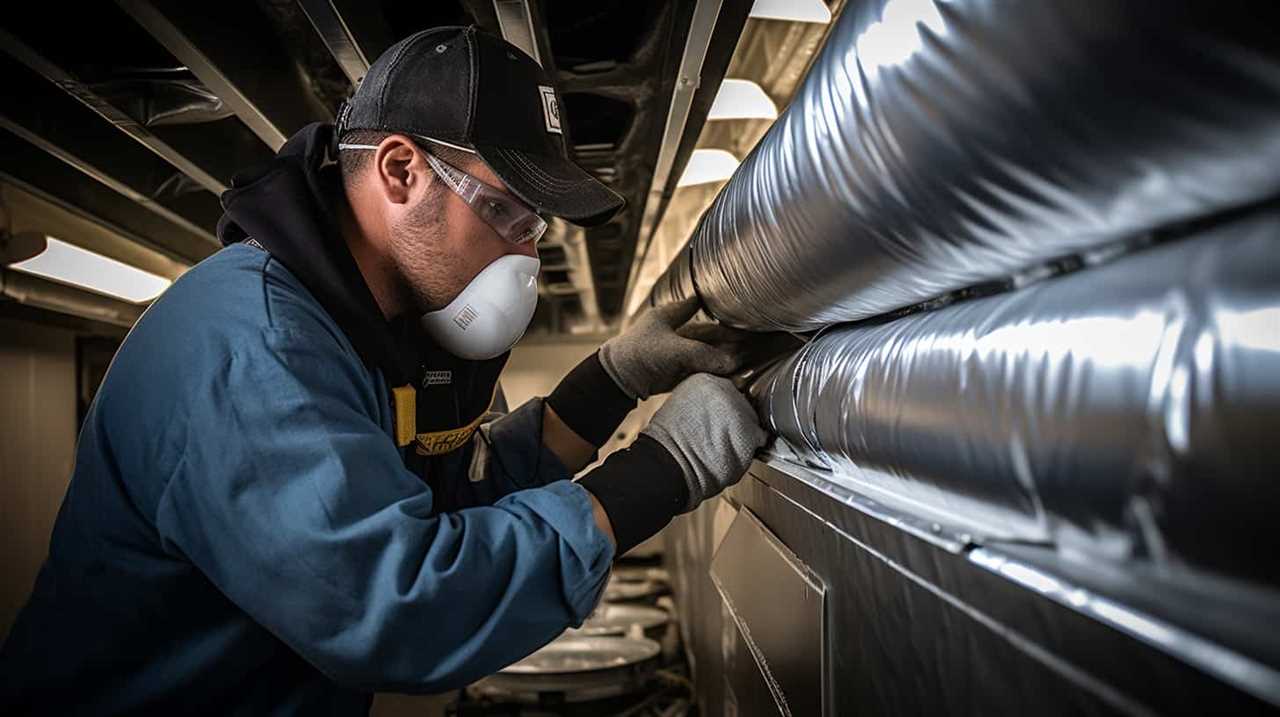
Conclusion
In conclusion, heat pump efficiency plays a crucial role in minimizing environmental damage caused by energy consumption. By maximizing heat pump efficiency, we can reduce greenhouse gas emissions and decrease our reliance on fossil fuels.
Just like a gentle breeze on a hot summer day, heat pump technology offers a refreshing solution to combat climate change and promote environmental sustainability.
As we continue to advance in heat pump technology, we pave the way for a greener future.
Energy Efficiency
Boost Your Heat Pump’s Efficiency: Innovative Tactics
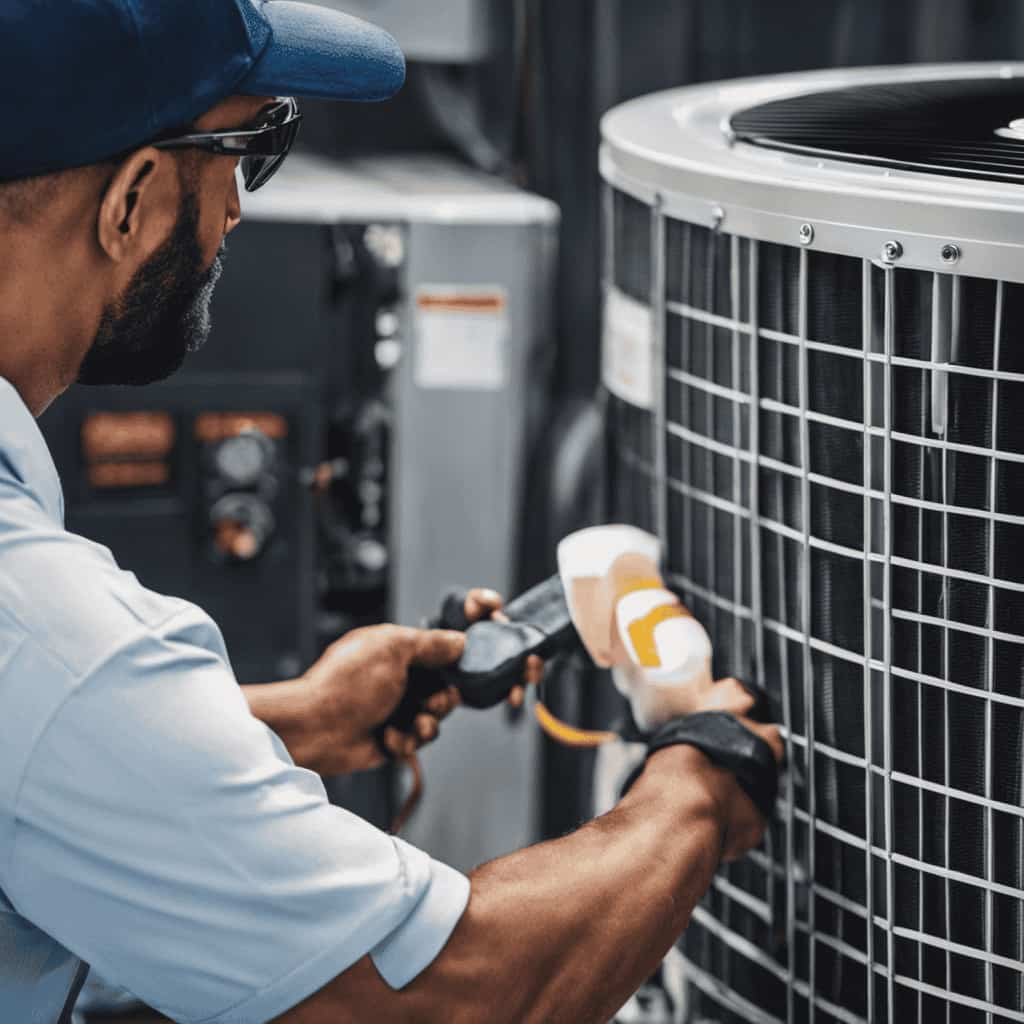
At our company, we believe that maximizing your heat pump’s efficiency is crucial for optimal performance. That’s why we’ve compiled a list of innovative tactics to help you boost your heat pump’s efficiency.
From properly sizing your system to utilizing advanced controls and automation, we’ve got you covered.
We’ll also explore the benefits of geothermal systems, optimizing airflow and ductwork design, and implementing energy recovery ventilation systems.
Get ready to take your heat pump’s efficiency to the next level with these cutting-edge strategies.

Key Takeaways
- Proper sizing maximizes heat pump efficiency
- Regular maintenance can improve efficiency and extend the lifespan of the heat pump
- Optimizing heat pump settings, such as adjusting the thermostat and utilizing zoning, can further optimize energy usage
- Insulation and sealing of the home can prevent heat loss or gain, improving overall heat pump efficiency
The Importance of Proper Sizing
Proper sizing is crucial for maximizing the efficiency of our heat pump. When it comes to heat pump efficiency, one of the most significant factors to consider is the size of the unit. A heat pump that’s too small for the space it needs to heat or cool will struggle to meet the required temperature demands, resulting in increased energy consumption. On the other hand, an oversized heat pump will cycle on and off frequently, leading to energy wastage and reduced efficiency.
Achieving the optimal size for our heat pump ensures that it operates at peak performance, minimizing energy consumption while effectively maintaining a comfortable indoor environment.
Now that we understand the importance of proper sizing, let’s explore the next strategy: utilizing advanced controls and automation to further enhance our heat pump’s efficiency.
Utilizing Advanced Controls and Automation
By incorporating advanced controls and automation, we can optimize the efficiency of our heat pump system. One way to achieve this is by using smart thermostats, which allow for precise temperature control and energy management. These thermostats use advanced algorithms to learn our heating and cooling preferences and adjust the temperature accordingly. They can also be programmed to automatically adjust the temperature based on our schedule, saving energy when we’re away.

Additionally, smart thermostats can be connected to our home’s Wi-Fi, enabling remote monitoring and control through a smartphone app. This means that we can adjust the temperature and monitor our heat pump system’s performance from anywhere, ensuring optimal efficiency and comfort.
Enhancing Heat Pump Performance With Geothermal Systems
By harnessing the natural heat stored in the ground, we can enhance our heat pump’s performance with geothermal systems.
Geothermal systems offer several advantages over traditional heating and cooling methods. Here are some benefits of geothermal systems:
-
Energy efficiency: Geothermal systems use the earth’s constant temperature to heat and cool your home, resulting in significant energy savings.

-
Cost savings: With geothermal systems, you can reduce your energy bills and potentially qualify for tax credits or incentives.
-
Environmental friendliness: Geothermal systems produce fewer greenhouse gas emissions and have a smaller carbon footprint compared to traditional heating and cooling methods.
-
Long lifespan: Geothermal systems are built to last and require minimal maintenance.
When considering geothermal system installation, it’s important to consult with a professional to ensure proper sizing and design for optimal performance. Proper installation and maintenance are crucial for maximizing the benefits of geothermal systems.
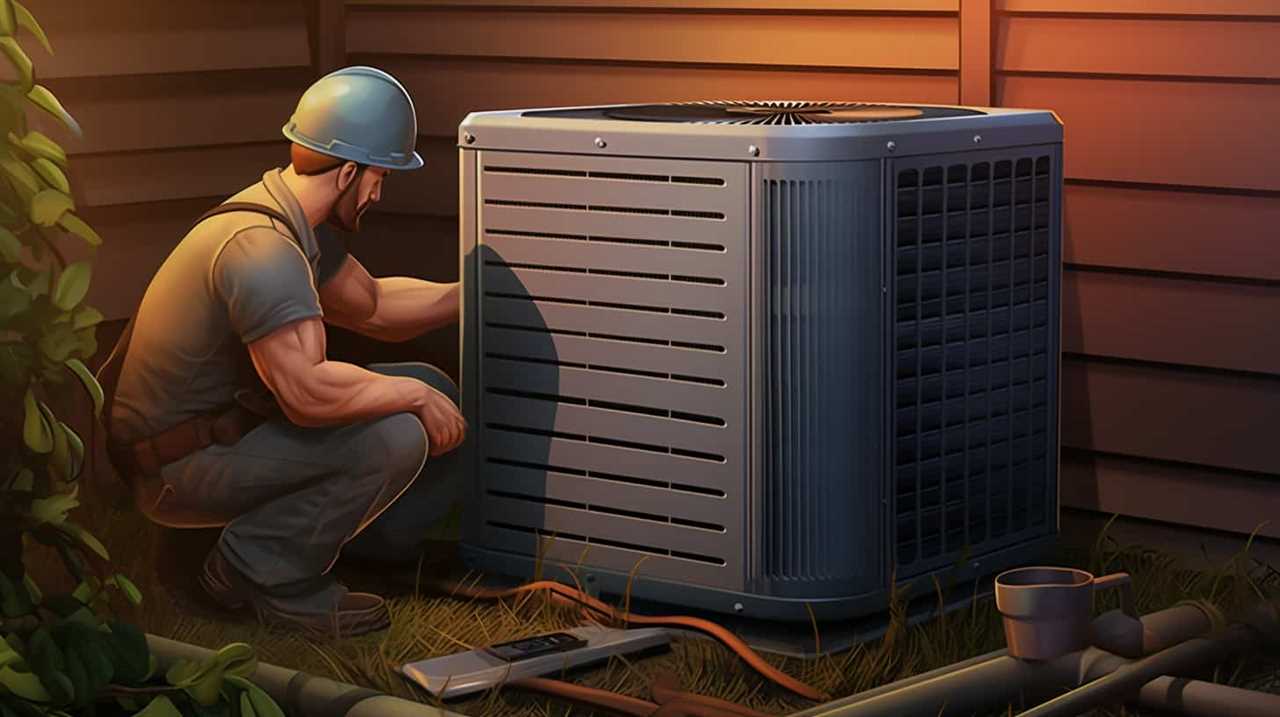
Optimizing Airflow and Ductwork Design
To improve our heat pump’s efficiency, we can optimize airflow and ductwork design. By ensuring proper airflow, we can enhance the heat transfer process and reduce energy consumption.
One way to achieve this is by improving insulation in ductwork. Properly insulated ducts prevent heat loss during the distribution of conditioned air, ensuring that the desired temperature is reached efficiently.
Additionally, reducing air leaks in the ductwork is crucial. Leaks can lead to energy wastage by allowing conditioned air to escape and unconditioned air to enter the system. Sealing these leaks not only improves efficiency but also enhances indoor air quality.
By optimizing airflow and ductwork design, we can maximize the performance of our heat pump system and achieve optimal energy efficiency.
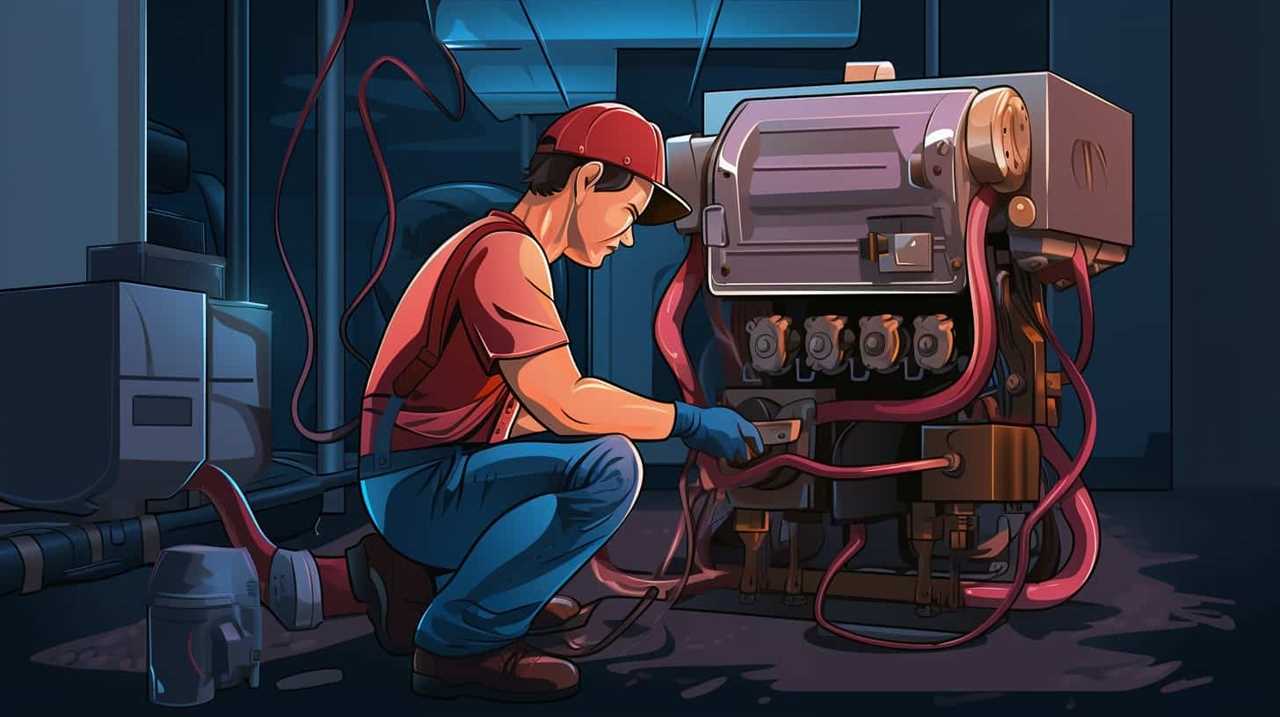
Now, let’s move on to the next section, where we’ll explore the benefits of implementing energy recovery ventilation systems.
Implementing Energy Recovery Ventilation Systems
We can enhance our heat pump’s efficiency by incorporating energy recovery ventilation systems, which help to improve indoor air quality and conserve energy. Energy recovery ventilation (ERV) systems are designed to exchange heat and moisture between the incoming and outgoing air streams. By implementing ERV systems, we can achieve the following benefits:
-
Improved indoor air quality: ERV systems help to remove pollutants and allergens from the indoor air, providing cleaner and healthier air for occupants.
-
Energy conservation: By recovering heat from the outgoing air and transferring it to the incoming air, ERV systems reduce the need for additional heating or cooling, resulting in reduced energy consumption.
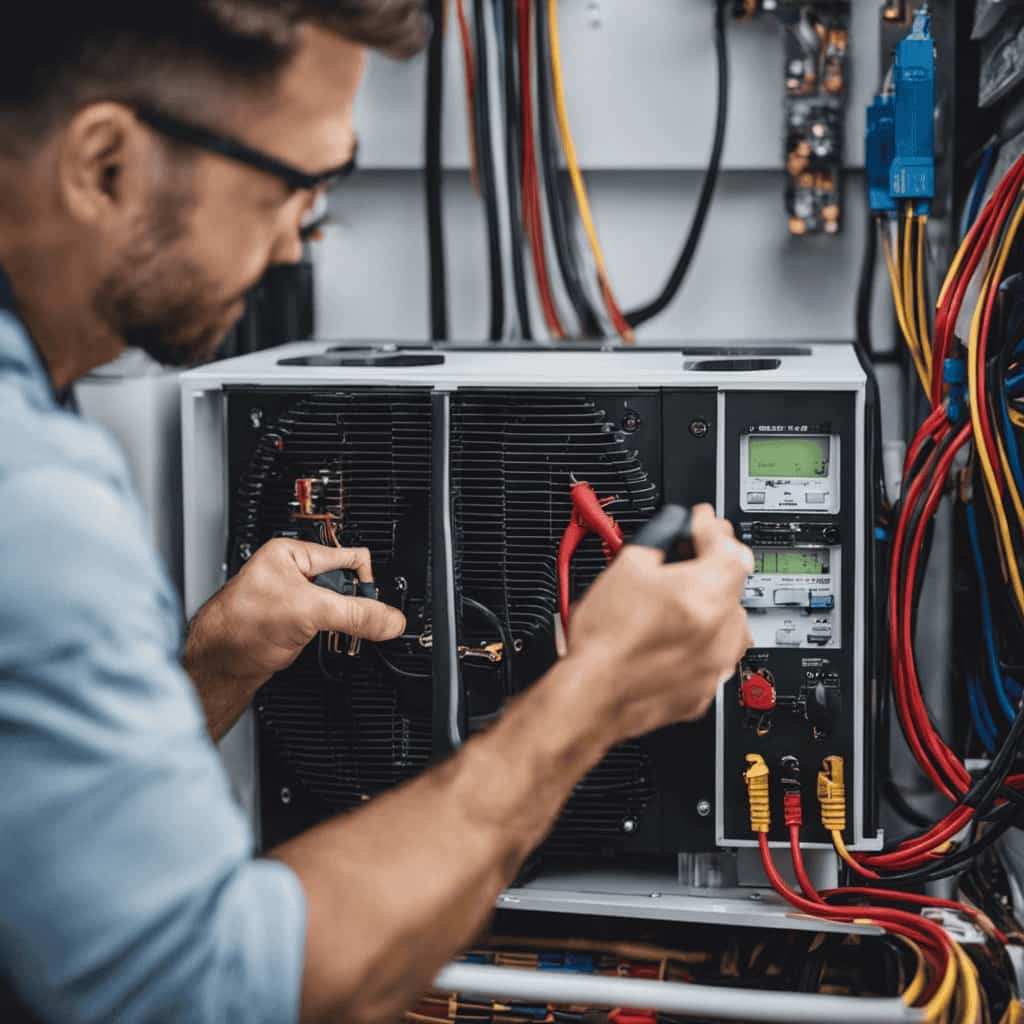
-
Enhanced comfort: ERV systems help to maintain a balanced indoor temperature and humidity level, ensuring a comfortable living environment.
-
Cost savings: With reduced energy consumption, implementing ERV systems can lead to significant cost savings on heating and cooling bills.
Frequently Asked Questions
How Often Should I Have My Heat Pump Serviced?
We should have our heat pump serviced regularly to ensure optimal performance. Signs of heat pump inefficiency include reduced heating or cooling capacity, strange noises, and increased energy bills. Regular maintenance and troubleshooting can address these issues.
Are There Any Tax Credits or Incentives Available for Upgrading to a More Efficient Heat Pump?
There are tax credits and energy incentives available for upgrading to a more efficient heat pump. These incentives provide financial benefits and encourage the adoption of energy-efficient technologies.
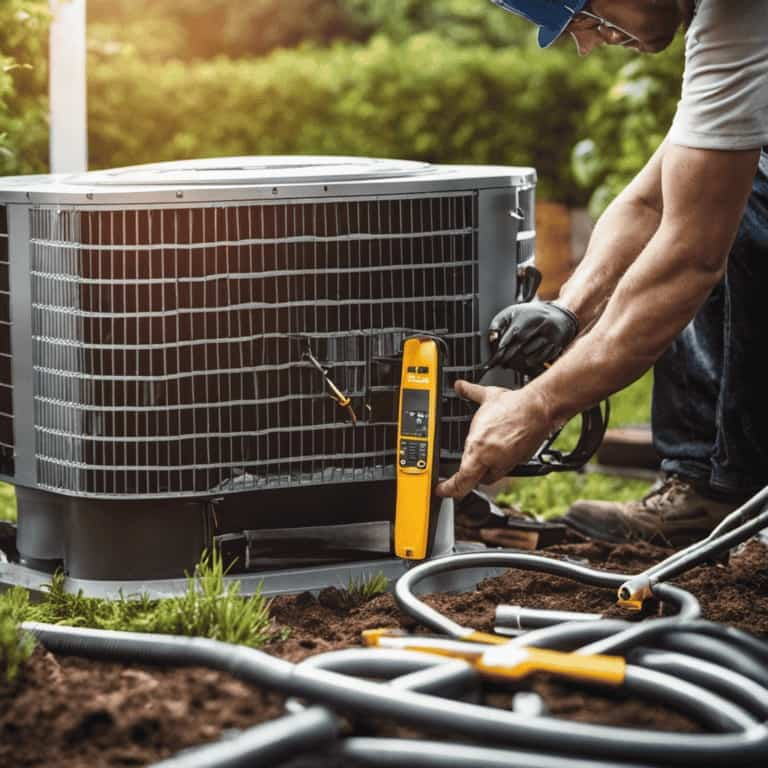
Can I Install a Heat Pump in an Older Home With Existing Ductwork?
Yes, you can install a heat pump in an older home with existing ductwork. It may require retrofitting the ductwork to ensure proper airflow and efficiency. Professional installation is recommended for optimal performance.
Is It Necessary to Have a Backup Heating System in Addition to a Heat Pump?
It is not necessary to have a backup heating system in addition to a heat pump, but it can provide peace of mind. Consider factors such as the cost effectiveness of backup systems before making a decision.
Are There Any Maintenance Tasks I Can Do Myself to Improve the Efficiency of My Heat Pump?
There are several DIY maintenance tasks we can do to improve our heat pump’s efficiency. By regularly cleaning and replacing filters, cleaning the outdoor unit, and ensuring proper airflow, we can enhance its performance.
Conclusion
In conclusion, optimizing the efficiency of your heat pump is crucial for saving energy and reducing costs.

Just like a well-oiled machine, a properly sized heat pump, advanced controls, geothermal systems, and optimized airflow and ductwork design work together seamlessly to provide maximum performance.
By implementing these innovative tactics, you can ensure that your heat pump operates at its peak efficiency, keeping you comfortable while minimizing your environmental impact.
Don’t let your heat pump be a rusty relic, invest in efficiency and reap the benefits.
Energy Efficiency
Optimize Heat Pump Efficiency: A Curated Guide

Welcome to our carefully curated guide on maximizing heat pump efficiency. We have compiled a wealth of knowledge and expertise to assist you in getting the best performance out of your heat pump.
In this guide, we’ll delve into understanding energy efficiency ratings, choosing the right size heat pump, proper installation techniques, maintenance tips, and advanced strategies.
Whether you’re a homeowner or a professional in the field, we’re here to provide you with intimate insights and practical advice for maximizing your heat pump’s efficiency.
Let’s get started!

Key Takeaways
- Energy efficiency ratings measure the energy consumption and heat production of heat pumps.
- Proper heat pump size is crucial for energy efficiency and comfort.
- Selecting the right location for the heat pump unit ensures proper airflow and maintenance access.
- Regular maintenance and servicing contribute to improved efficiency.
Understanding Energy Efficiency Ratings
We will now delve into understanding energy efficiency ratings to optimize heat pump efficiency.
When it comes to energy efficient appliances, heat pumps stand out as a reliable choice. Energy efficiency ratings play a crucial role in determining the effectiveness of these appliances.
These ratings measure the amount of energy a heat pump consumes compared to the heat it produces. The higher the rating, the more efficient the heat pump is, resulting in lower energy consumption and reduced utility bills.
By investing in energy efficient appliances like heat pumps, you can enjoy several benefits. Not only will you save money on your energy bills, but you’ll also reduce your carbon footprint and contribute to a more sustainable future.
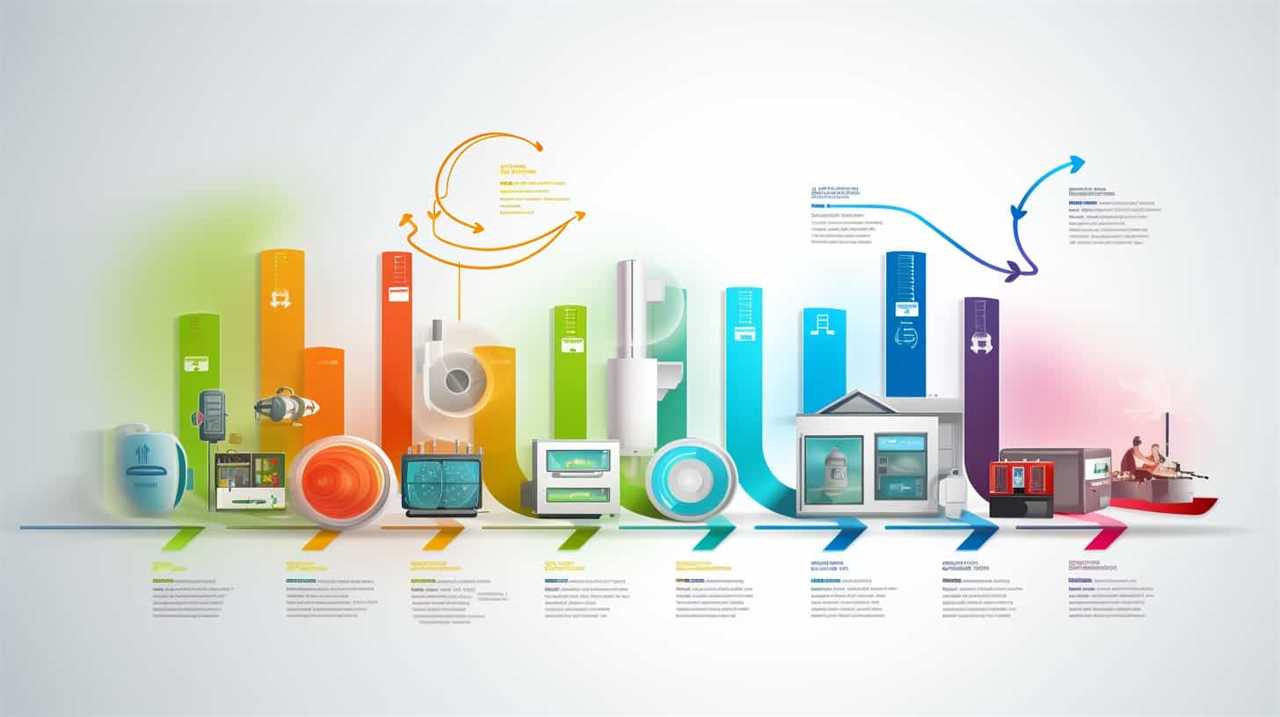
Now, let’s explore the next important aspect of optimizing heat pump efficiency: choosing the right size heat pump.
Choosing the Right Size Heat Pump for Energy Efficiency
To ensure optimal energy efficiency, it is important to choose the right size heat pump for your specific needs. Heat pump size considerations play a crucial role in achieving energy efficiency and comfort in your home. Selecting a heat pump that is too large or too small for your space can lead to wasted energy and decreased efficiency.
When determining the size of heat pump you need, several factors should be taken into account. These include the square footage of your home, insulation levels, climate, and the number of windows and doors. It is recommended to consult with a professional HVAC technician to accurately assess your requirements and recommend the appropriate size for your space.
Below is a table highlighting some energy efficient heat pump models and their corresponding heating and cooling capacities:
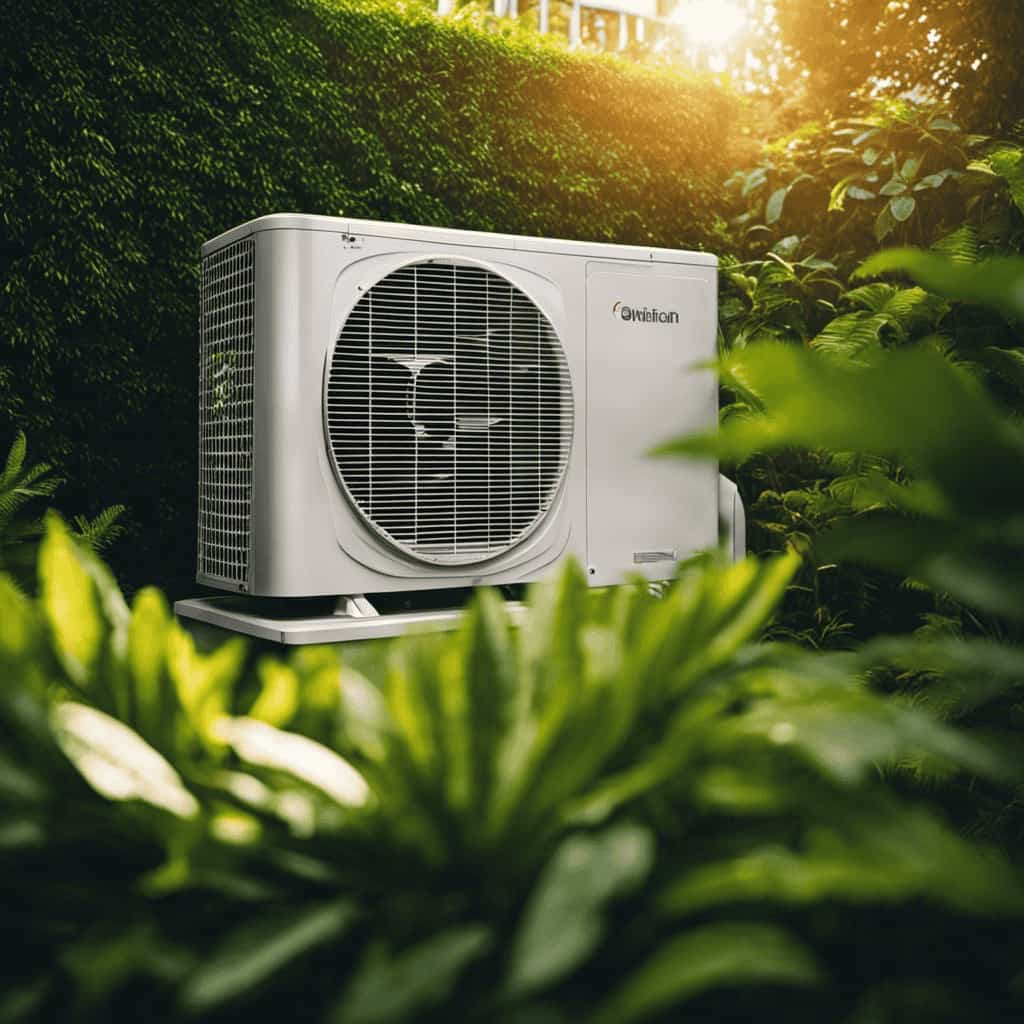
| Heat Pump Model | Heating Capacity (BTU/h) | Cooling Capacity (BTU/h) |
|---|---|---|
| Model A | 24,000 | 18,000 |
| Model B | 36,000 | 24,000 |
| Model C | 48,000 | 36,000 |
| Model D | 60,000 | 42,000 |
| Model E | 72,000 | 48,000 |
Choosing the right size heat pump is essential for achieving energy efficiency and maintaining comfort in your home. By considering heat pump size considerations and consulting with a professional, you can ensure that your heat pump is properly sized for optimal performance.
Proper Heat Pump Installation Techniques for Improved Efficiency
When properly installed, heat pumps can achieve improved efficiency by utilizing specific techniques.
Proper heat pump installation methods are crucial in ensuring optimal performance and energy savings. One important technique is selecting the right location for the heat pump unit. It should be placed in a spot that allows for proper airflow and easy access for maintenance.
Additionally, proper insulation and sealing of ductwork is essential to prevent heat loss or gain. This can be achieved by using high-quality insulation materials and sealing any gaps or leaks in the ductwork.
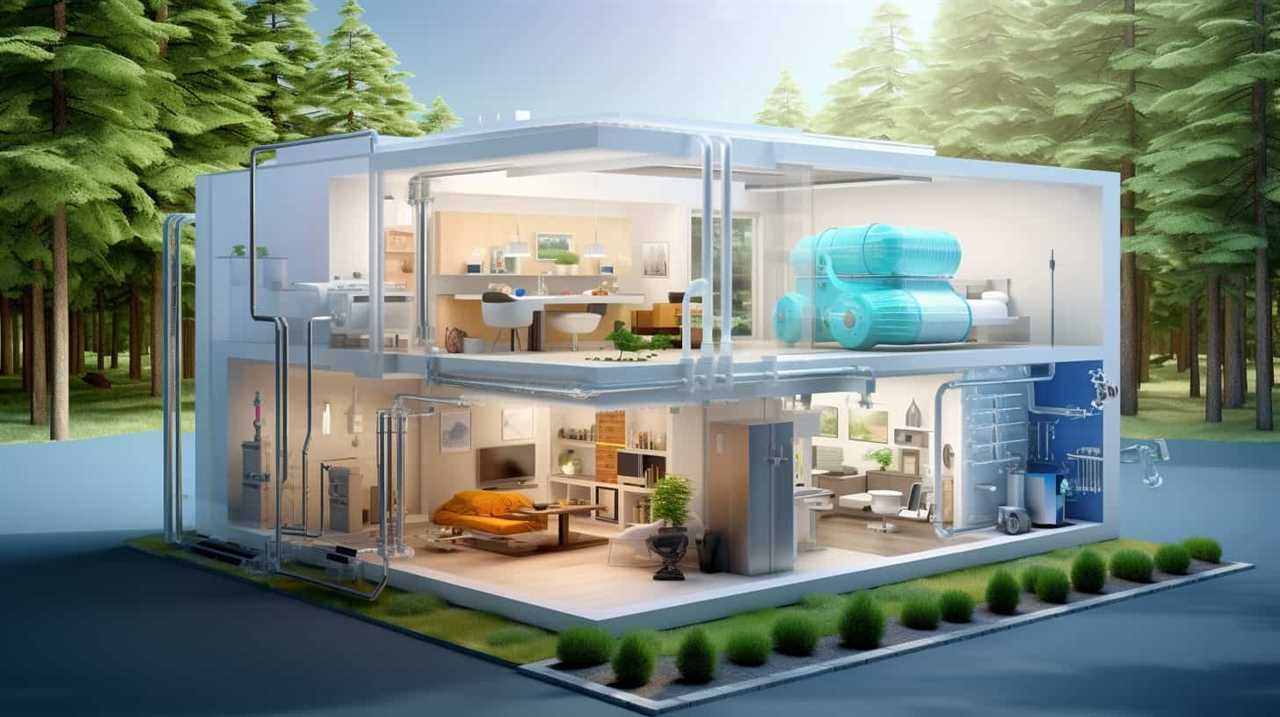
Furthermore, ensuring proper refrigerant charge and airflow is important for efficient heat pump operation. Regular maintenance and servicing by qualified professionals can also contribute to improved efficiency.
Maintenance Tips for Maximizing Heat Pump Efficiency
Our team recommends regular maintenance as a key strategy for maximizing heat pump efficiency. By implementing proper maintenance practices, you can ensure that your heat pump operates at its optimal level, saving energy and reducing costs.
One important maintenance task is regularly cleaning or replacing the air filters. Dirty filters can restrict airflow, making your heat pump work harder and consume more energy.
Additionally, it’s crucial to inspect and clean the coils, as dirt and debris can accumulate and hinder heat transfer.

Another energy-saving practice is to keep the outdoor unit clear of any obstructions, such as vegetation or debris.
Lastly, if you notice any issues with your heat pump, such as unusual noises or insufficient heating or cooling, it’s recommended to troubleshoot the problem or contact a professional for assistance.
By following these maintenance tips and troubleshooting any issues, you can optimize the efficiency of your heat pump.
In the next section, we’ll explore advanced strategies for enhancing heat pump energy efficiency.

Advanced Strategies for Enhancing Heat Pump Energy Efficiency
One effective strategy for enhancing heat pump energy efficiency is by utilizing programmable thermostats to control temperature settings throughout the day. By integrating smart thermostats into your heat pump system, you can optimize energy usage based on your specific needs and preferences.
Here are five advanced strategies that can further enhance the energy efficiency of your heat pump:
-
Geothermal heat pump technology: This innovative system harnesses the stable temperature of the earth to provide efficient heating and cooling.
-
Weather-based temperature control: Smart thermostats can adjust temperature settings based on weather forecasts, ensuring optimal comfort and energy savings.

-
Zoning systems: Divide your home into different zones and control the temperature separately in each area, allowing for customized comfort and reduced energy consumption.
-
Heat pump optimization algorithms: Advanced algorithms can continuously analyze and adjust heat pump performance to maximize efficiency.
-
Energy monitoring and reporting: Real-time energy monitoring and detailed reports can help you track and analyze your heat pump’s energy usage, enabling you to make informed decisions for further efficiency improvements.
Frequently Asked Questions
Can I Install a Heat Pump on My Own, or Do I Need to Hire a Professional?
We can install a heat pump on our own, but it’s important to consider the pros and cons. DIY installation tips can be helpful, but hiring a professional ensures expertise and avoids potential mistakes.
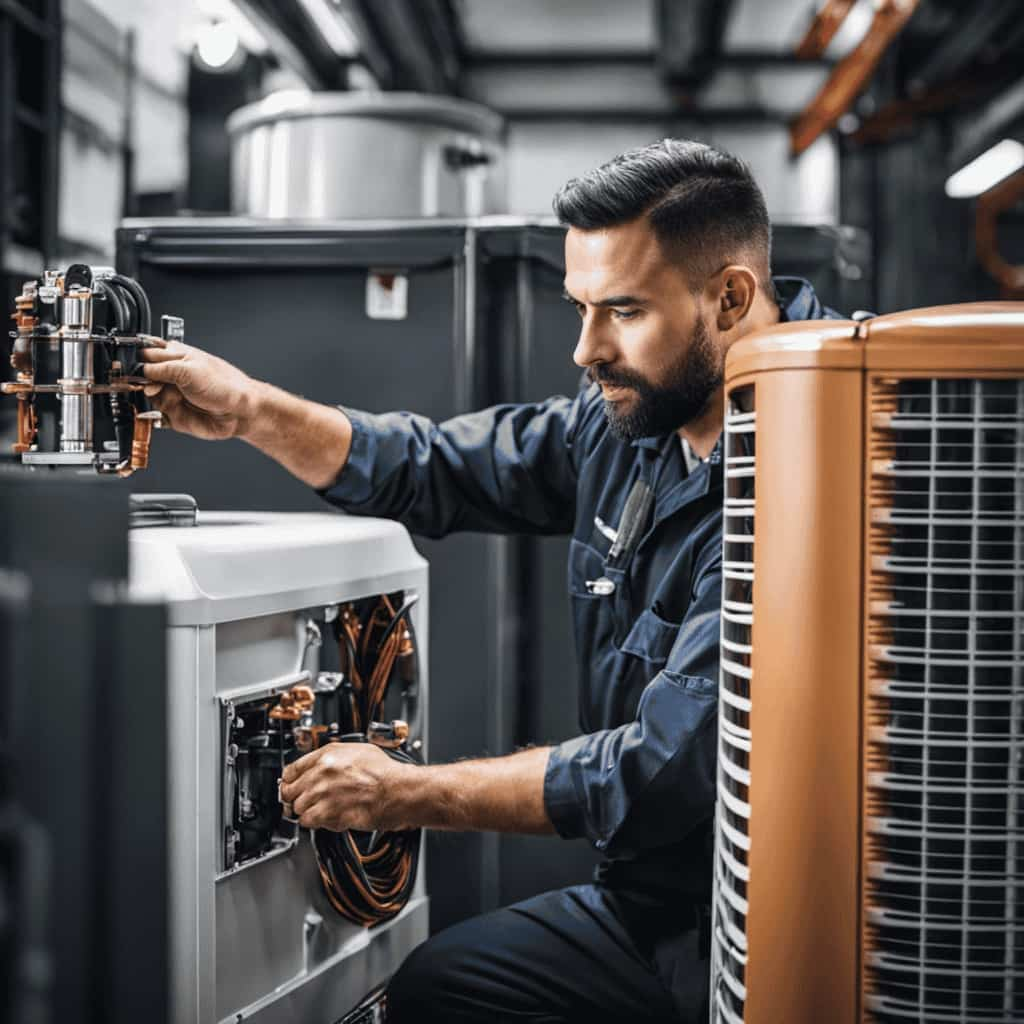
How Often Should I Clean or Replace the Filters in My Heat Pump for Optimal Efficiency?
We clean or replace our heat pump filters regularly for optimal efficiency. The cleaning frequency and filter replacement depend on factors like usage, air quality, and manufacturer’s recommendations.
Are There Any Government Incentives or Tax Credits Available for Upgrading to a More Energy-Efficient Heat Pump?
Government incentives and tax credits can significantly offset the cost of upgrading to a more energy-efficient heat pump. These financial benefits make it a wise choice for homeowners looking to save money and reduce their carbon footprint.
What Are Some Common Signs That Indicate My Heat Pump May Not Be Operating Efficiently?
Signs of heat pump inefficiency include reduced heating or cooling output, frequent cycling on and off, and unusual noises. To improve performance, regular maintenance, cleaning or replacing filters, and ensuring proper airflow are important.
Can I Use My Heat Pump for Both Heating and Cooling Purposes, or Do I Need a Separate System for Each?
Yes, you can use a heat pump for both heating and cooling purposes. A dual purpose system offers the benefits of efficient energy use, cost savings, and year-round comfort in controlling the temperature of your home.

Conclusion
In conclusion, optimizing heat pump efficiency requires a comprehensive approach. Understanding energy efficiency ratings, selecting the right size heat pump, ensuring proper installation techniques, and regular maintenance are all vital steps.
Additionally, advanced strategies can further enhance energy efficiency. By implementing these measures, homeowners can maximize the performance of their heat pumps, saving energy and reducing costs in the long run.
Energy Efficiency
Maximizing Heat Pump Efficiency: An Essential Guide

Have you ever thought about how to maximize the efficiency of your heat pump? Well, we’ve got you covered!
In this essential guide, we’ll show you the insider tips and tricks to maximize heat pump efficiency. From understanding energy ratings to key factors that affect performance, we’ll provide you with the knowledge you need to keep your heat pump running smoothly.
So, let’s dive in and discover how to make your heat pump work smarter, not harder.
Key Takeaways
- Seasonal Energy Efficiency Ratio (SEER) measures cooling efficiency
- Heating Seasonal Performance Factor (HSPF) measures heating efficiency
- Regular maintenance is crucial for maximizing efficiency
- Use programmable thermostat and seal air leaks
Understanding Heat Pump Energy Efficiency Ratings
We’ll start by looking at the three main heat pump energy efficiency ratings.
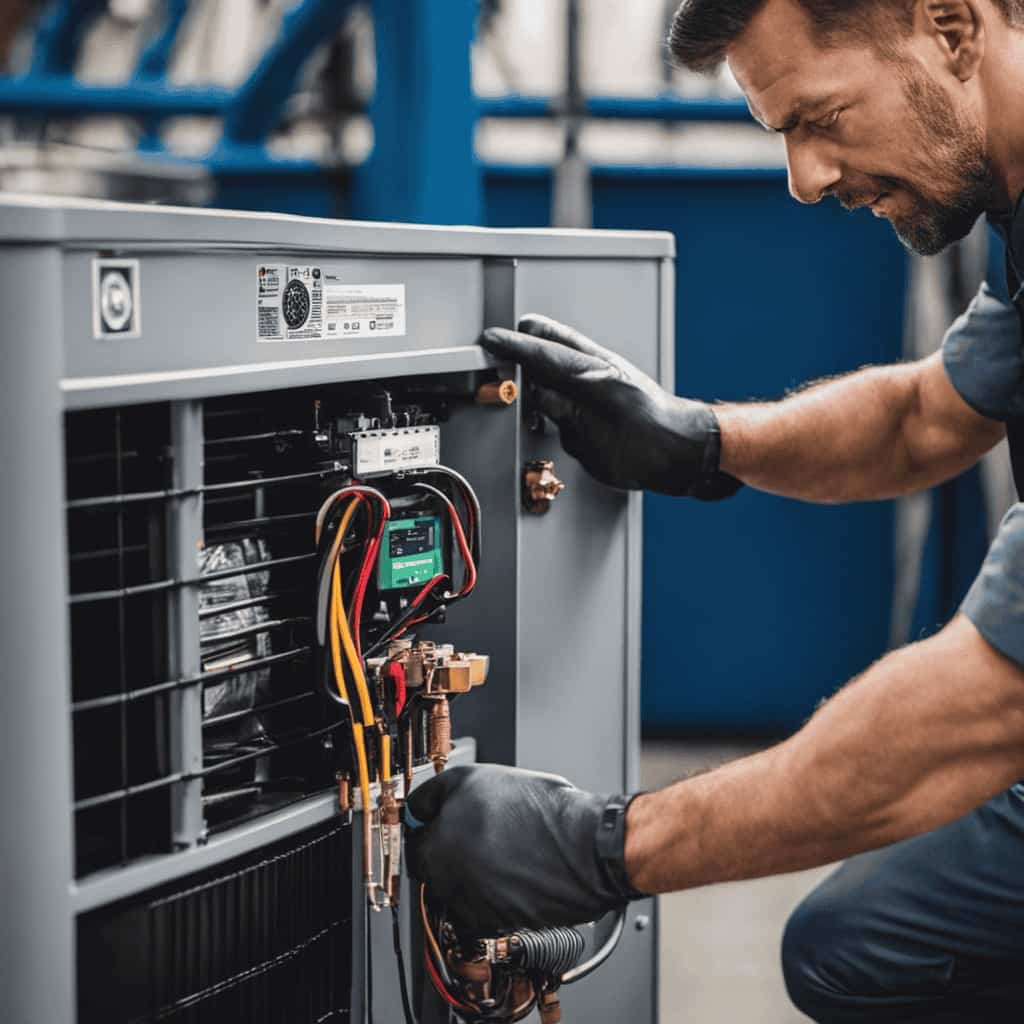
Understanding these ratings is crucial in maximizing the efficiency of your heat pump.
The first rating is the Seasonal Energy Efficiency Ratio (SEER), which measures the cooling efficiency of the heat pump. The higher the SEER rating, the more energy efficient the heat pump is.
The second rating is the Heating Seasonal Performance Factor (HSPF), which measures the heating efficiency of the heat pump. Again, a higher HSPF rating means greater energy efficiency.
Lastly, we have the Energy Efficiency Ratio (EER), which measures the efficiency of the heat pump at a specific outdoor temperature.

High energy efficiency ratings offer several benefits, including lower energy bills, reduced environmental impact, and improved comfort.
Key Factors Affecting Heat Pump Efficiency
There are several key factors that can significantly impact the efficiency of our heat pump. Understanding these factors is essential for maximizing the performance of our system. Here are three important considerations:
-
Seasonal Variations: The efficiency of heat pumps can vary depending on the season. In colder months, when outdoor temperatures are lower, heat pumps need to work harder to extract heat from the air. This can reduce their efficiency and result in higher energy consumption. Conversely, in warmer months, heat pumps can operate more efficiently, as the temperature differential is smaller.
-
Climate Considerations: The climate in which we live plays a crucial role in heat pump efficiency. In regions with extreme cold or hot temperatures, heat pumps may struggle to provide adequate heating or cooling. It’s important to choose a heat pump that’s appropriate for the local climate and consider auxiliary heating or cooling systems for extreme conditions.

-
System Maintenance: Regular maintenance is vital for maximizing heat pump efficiency. Cleaning or replacing air filters, checking refrigerant levels, and ensuring proper airflow are all important tasks. Neglecting maintenance can lead to reduced efficiency, increased energy consumption, and potential system failures.
Tips for Improving Heat Pump Energy Efficiency
How can we effectively improve the energy efficiency of our heat pump? Regular heat pump maintenance and implementing energy-saving tips are key. By following these practices, we can ensure that our heat pump operates at its highest efficiency, reducing energy consumption and saving money in the process.
To help you get started, here are some simple yet effective energy-saving tips:
| Maintenance | Efficiency Tips | Lifestyle Changes |
|---|---|---|
| Schedule regular professional maintenance for your heat pump | Set the thermostat at an optimal temperature | Turn off the heat pump when not in use |
| Clean or replace air filters regularly | Use a programmable thermostat to adjust temperatures | Keep doors and windows closed |
| Inspect and clean outdoor coils | Seal air leaks in ducts and around windows and doors | Use ceiling fans to circulate air |
| Clear debris and vegetation around the outdoor unit | Use natural ventilation and reduce reliance on the pump | Dress warmly and use blankets instead of cranking up the heat |
Best Practices for Maintaining Heat Pump Efficiency
Let’s explore the best practices for maintaining heat pump efficiency to ensure optimal performance and energy savings. Here are three key techniques for effective heat pump maintenance and energy savings:

-
Regular Filter Cleaning:
Dirty air filters can restrict airflow and reduce heat pump efficiency. Cleaning or replacing the filters every 1 to 3 months is essential to maintain proper airflow and prevent system strain. -
Coil Cleaning:
Over time, dust and debris can accumulate on the evaporator and condenser coils, hindering heat transfer. Regularly cleaning these coils with a soft brush or vacuum can improve heat pump efficiency and prevent breakdowns. -
Annual Professional Maintenance:
Scheduling an annual maintenance service by a qualified technician is crucial for identifying and resolving any potential issues. They can inspect, clean, and tune up the heat pump, ensuring it operates at maximum efficiency.
By following these heat pump maintenance and energy-saving techniques, you can enjoy optimal performance and lower energy bills.
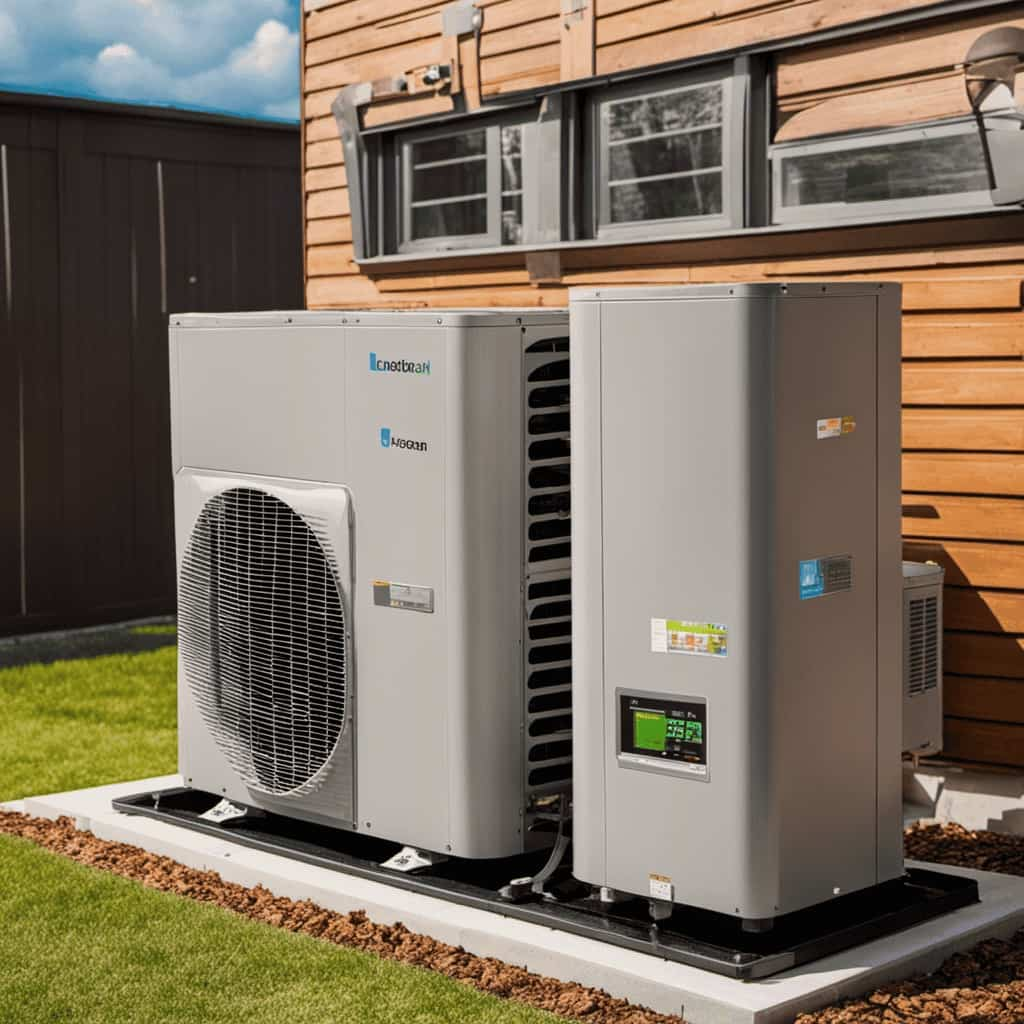
Now, let’s dive into advanced strategies to maximize heat pump performance.
Advanced Strategies to Maximize Heat Pump Performance
We can implement several advanced strategies to significantly increase heat pump performance and achieve maximum efficiency. One way to do this is by using smart control systems that optimize the heat pump’s operation based on real-time data. These systems can adjust the settings to match the specific needs of the space being heated or cooled, resulting in optimal performance and energy savings. Another strategy is to ensure that the heat pump is set to the most efficient settings. This includes programming the thermostat to match the occupants’ schedules and preferences, as well as adjusting the temperature according to the outdoor conditions. By utilizing smart control and optimizing the settings, we can maximize the efficiency of the heat pump and reduce energy consumption.
| Advanced Strategies | Benefits |
|---|---|
| Smart control systems | Optimizes heat pump operation based on real-time data |
| Optimal settings | Adjusts temperature according to outdoor conditions and occupants’ schedules |
| Result | Maximizes efficiency and reduces energy consumption |
Frequently Asked Questions
Can I Use a Heat Pump in Extremely Cold Climates?
Yes, we can use a heat pump in extremely cold climates. However, heat pump performance in extreme cold can be reduced. Alternative heating options for cold climates may be necessary to maintain optimal comfort.
How Can I Determine if My Heat Pump Is Running Efficiently?
We can determine if our heat pump is running efficiently by conducting regular heat pump maintenance and looking out for signs of heat pump inefficiency. This ensures optimal performance and energy savings.

What Are the Potential Drawbacks of Using a Heat Pump for Heating and Cooling?
Using a heat pump for heating and cooling may have drawbacks such as noise levels and initial installation cost. However, we can help you understand these issues and find solutions for maximum efficiency.
Are There Any Government Incentives or Rebates Available for Installing a Heat Pump?
Yes, there are government incentives and rebates available for installing a heat pump. These incentives aim to promote energy savings and encourage homeowners to choose more efficient heating and cooling systems.
Can I Use My Heat Pump to Heat My Swimming Pool or Hot Tub?
Yes, you can use a heat pump to heat your swimming pool or hot tub. It offers several advantages, such as energy efficiency and cost savings, making it a popular choice for water heating applications.
Conclusion
In conclusion, when it comes to maximizing heat pump efficiency, understanding energy efficiency ratings and key factors affecting performance is crucial. By following tips for improving energy efficiency and implementing best practices for maintenance, you can ensure your heat pump operates at its peak performance.

Remember, just as a well-tuned instrument produces beautiful melodies, a well-maintained heat pump will keep your home comfortably warm or cool. So, take care of your heat pump like a maestro cares for their instrument, and enjoy the harmonious benefits of maximum efficiency.
-

 Residential and Commercial Applications2 weeks ago
Residential and Commercial Applications2 weeks agoBest Amana Heat Pump Reviews
-

 Thermal Energy Transfer2 weeks ago
Thermal Energy Transfer2 weeks agoBreakthroughs in Modern Heat Pump Systems: Thermal Energy Edition
-

 Residential and Commercial Applications2 weeks ago
Residential and Commercial Applications2 weeks agoBest Heat Pump
-

 Geothermal Heat Pumps3 months ago
Geothermal Heat Pumps3 months agoUpgrade Your Comfort with Our Efficient HVAC Systems
-

 Air Conditioning3 months ago
Air Conditioning3 months agoExploring Energy-Efficient Air Conditioning Heat Pumps
-

 Geothermal Heat Pumps3 months ago
Geothermal Heat Pumps3 months agoInnovative Geothermal Heat Pump Manufacturers Revolutionize Energy Efficiency
-

 Thermal Energy Transfer1 month ago
Thermal Energy Transfer1 month agoBoost Your Heat Pump Efficiency: Interactive Guide
-

 Residential and Commercial Applications2 weeks ago
Residential and Commercial Applications2 weeks agoBest Portable Heat Pump Heat & AC










